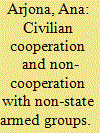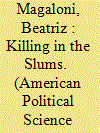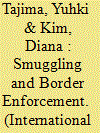|
|
|
Sort Order |
|
|
|
Items / Page
|
|
|
|
|
|
|
| Srl | Item |
| 1 |
ID:
153613


|
|
|
|
|
| Summary/Abstract |
Terms like ‘support’ and ‘collaboration’ are often used interchangeably to denote a loose set of acts or attitudes that benefit non-state armed groups (NSAGs). However, these terms are seldom defined, and the alternatives available to civilians are rarely identified. Moreover, existing approaches overlook that the interaction between civilians and NSAGs is often one between ruler and ruled, which makes obedience and resistance central. This paper proposes to conceptualize the choices available to civilians as forms of cooperation and non-cooperation, offers a typology, and discusses the implications for theory building on civilian and NSAG behavior, and on the functioning of armed social orders.
|
|
|
|
|
|
|
|
|
|
|
|
|
|
|
|
| 2 |
ID:
172542


|
|
|
|
|
| Summary/Abstract |
State interventions against organized criminal groups (OCGs) sometimes work to improve security, but often exacerbate violence. To understand why, this article offers a theory about criminal governance in five types of criminal regimes—Insurgent, Bandit, Symbiotic, Predatory, and Split. These differ according to whether criminal groups confront or collude with state actors, abuse or cooperate with the community, and hold a monopoly or contest territory with rival OCGs. Police interventions in these criminal regimes pose different challenges and are associated with markedly different local security outcomes. We provide evidence of this theory by using a multimethod research design combining quasi-experimental statistical analyses, automated text analysis, extensive qualitative research, and a large-N survey in the context of Rio de Janeiro’s “Pacifying Police Units” (UPPs), which sought to reclaim control of the favelas from criminal organizations.
|
|
|
|
|
|
|
|
|
|
|
|
|
|
|
|
| 3 |
ID:
165429


|
|
|
|
|
| Summary/Abstract |
States, rebels, and mafias all provide governance beyond their core membership; increasingly, so do prison gangs. US gangs leverage control over prison life to govern street-level drug markets. Brazil’s Primeiro Comando da Capital (PCC) gang goes further, orchestrating paralyzing attacks on urban targets, while imposing a social order throughout slums that sharply reduces homicides. We analyze hundreds of seized PCC documents detailing its drug business and internal disciplinary system. Descriptively, we find vast, consignment-based trafficking operations whose profits fund collective benefits for members’ families; elaborate bureaucratic procedures and recordkeeping; and overwhelmingly nonviolent punishments for debt-nonpayment and misconduct. These features, we argue, reflect a deliberate strategy of creating rational-bureaucratic legitimacy in criminal governance. The PCC’s collectivist norms, fair procedures, and meticulous “criminal criminal records” facilitate community stigmatization of infractors, giving mild sanctions punitive heft and inducing widespread voluntary compliance without excessive coercion. This has aided the PCC’s rapid expansion across Brazil.
|
|
|
|
|
|
|
|
|
|
|
|
|
|
|
|
| 4 |
ID:
188387


|
|
|
|
|
| Summary/Abstract |
This article analyzes the efficacy of border enforcement against smuggling. We argue that walls, fences, patrols, and other efforts to secure porous borders can reduce smuggling, but only in the absence of collusion between smugglers and state agents at official border crossings. When such corruption occurs, border enforcement merely diverts smuggling flows without reducing their overall volume. We also identify the conditions under which corruption occurs and characterize border enforcement as a sorting mechanism that allows high-skilled smugglers to forge alternative border-crossing routes while deterring low-skilled smugglers or driving them to bribe local border agents. Combining a formal model and an archival case study of opium smuggling in Southeast Asia, we demonstrate that border enforcement has conditional effects on the routes and volumes of smuggling, depending on the nature of interactions between smugglers and border agents. By drawing attention to the technological and organizational aspects of smuggling, this article brings scholarship on criminal governance into the study of international relations, and contributes to debates on the effects of border enforcement and border politics more generally.
|
|
|
|
|
|
|
|
|
|
|
|
|
|
|
|
|
|
|
|
|